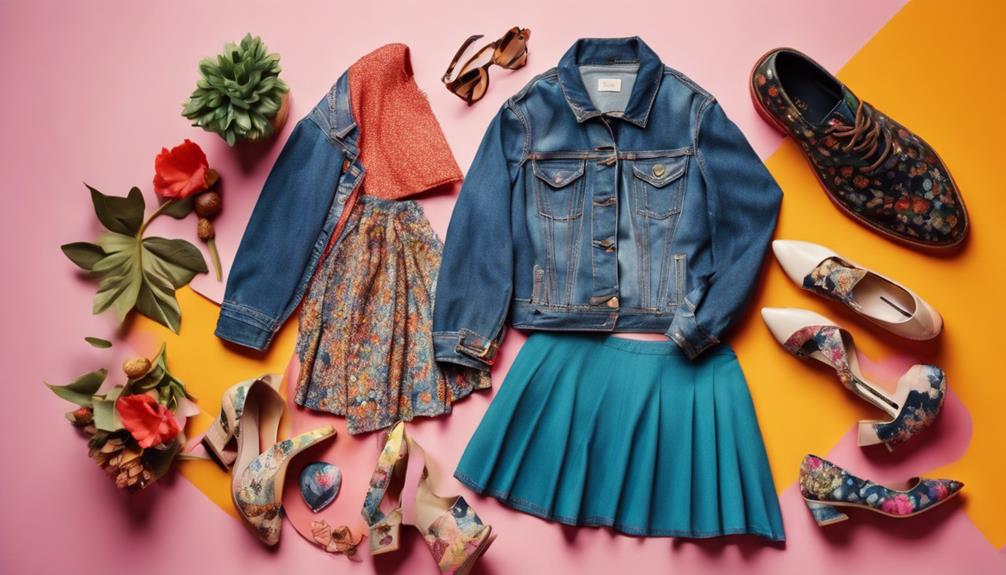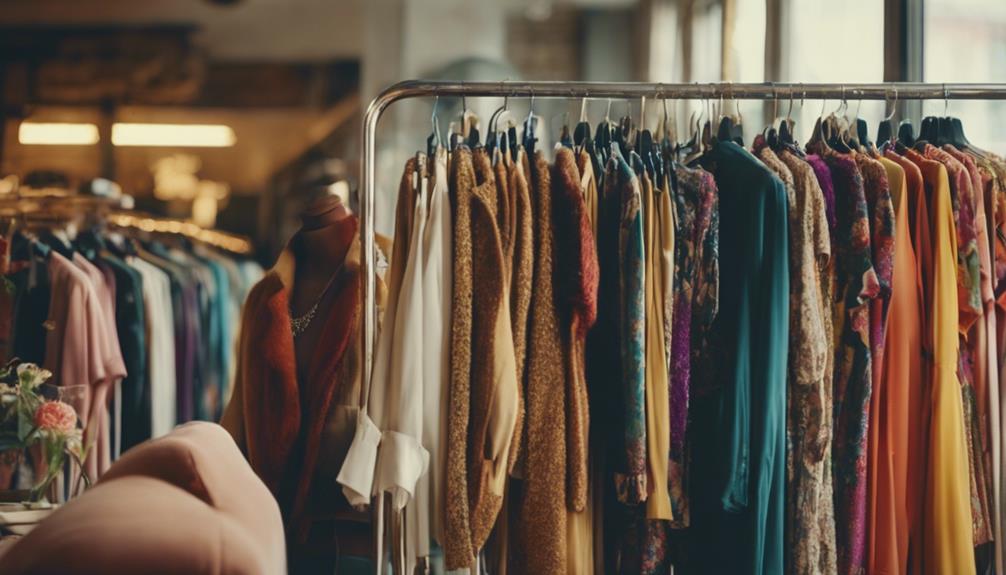You have the opportunity to delve into sustainable fashion at prestigious institutions such as Central Saint Martins in London or Parsons School of Design in NYC. These schools provide programs that emphasize sustainable materials, ethical practices, and inventive design solutions. Through these programs, you will gain the skills to evaluate environmental impacts and experiment with cutting-edge technologies like 3D printing and biodegradable textiles. The University of Boras in Sweden and IED Barcelona offer distinctive insights into sustainable textiles as well. With the increasing demand for eco-friendly practices, your career prospects will also broaden. Are you intrigued by the endless possibilities and advancements awaiting you in this field? There is so much more to explore!
Key Takeaways
- Central Saint Martins, London offers specialized Bachelor's and Master's degrees focused on sustainability in fashion design and resource management.
- Parsons School of Design, NYC emphasizes inclusivity and diversity within its rigorous sustainable design curriculum, preparing students for a changing industry.
- University of Boras, Sweden is renowned for its advanced research in sustainable textiles, integrated into comprehensive Bachelor's and Master's programs.
- IED Barcelona specializes in sustainability in fashion, using innovative teaching methods that highlight sustainable design practices and eco-friendly materials.
Top Institutions for Sustainable Fashion
When it comes to studying sustainable fashion, several top institutions stand out for their innovative programs and commitment to environmental responsibility.
Central Saint Martins in London offers a range of sustainability programs, including Bachelor's and Master's degrees that tackle urgent changes in resource management within fashion practices.
If you're looking for a school focused on inclusivity and diversity, Parsons School of Design in New York City prepares you for competitive roles through its rigorous sustainable design curriculum.
The University of Boras in Sweden is renowned for its advanced research in textile and fashion design, seamlessly integrating sustainable practices into both its Bachelor's and Master's programs. This institution is ideal if you're interested in deepening your understanding of sustainable textiles.
Meanwhile, IED Barcelona specializes in sustainability in fashion, offering courses that employ innovative teaching methods to emphasize sustainable design practices.
These institutions not only equip you with the knowledge needed for a successful career in sustainable fashion but also foster a commitment to making a positive impact on the industry.
Choosing any of these schools can pave the way for your future in this essential field.
Key Curriculum Elements

Key curriculum elements in sustainable fashion programs focus on equipping you with essential skills in sustainable materials, ethical labor practices, and innovative design solutions.
You'll investigate sustainable fashion by learning how to choose eco-friendly textiles that reduce environmental impact. Understanding ethical fashion is vital, as you'll study fair trade principles that highlight humane working conditions in the fashion industry.
Another key aspect is lifecycle assessment training, where you'll measure the environmental impact of garments throughout the value creation process towards sustainability. This knowledge will empower you to make informed decisions that resonate with eco-conscious consumers.
In addition, you'll explore fashion systems that prioritize ethical sourcing and sustainability. Creative problem-solving is emphasized, encouraging you to leverage technology and design innovations to craft sustainable fashion products.
Industry Trends and Innovations

In today's fashion landscape, you'll notice a strong push towards sustainable practices, driven by emerging technologies and innovative materials.
As you explore these trends, consider how circular economy models are reshaping the industry by extending product lifecycles.
It's an exciting time to engage with these changes and see how they influence your studies in sustainable fashion.
Emerging Technologies in Fashion
Emerging technologies in fashion are revolutionizing the industry by enabling sustainable practices that minimize waste and enhance efficiency.
For instance, 3D printing allows for customized, on-demand production, cutting down on the waste associated with overproduction. This innovation aligns perfectly with your desire for sustainable production methods.
Moreover, smart textiles are being developed to incorporate sensors and adaptive materials, providing functionality while reducing environmental impact.
Blockchain technology plays a vital role in improving supply chains, ensuring brands can authenticate their sustainable practices and guarantee ethical sourcing of materials.
Artificial intelligence is another game-changer, analyzing consumer behavior to forecast trends, which leads to better inventory management and helps you avoid unsold stock. These advancements not only promise a future where fashion is more sustainable but also help you stay ahead in a competitive market.
As you explore your options in sustainable fashion education, keep an eye on innovations in biodegradable materials.
Research into plant-based alternatives to traditional textiles is paving the way for a more eco-friendly fashion future, making it an exciting time to be involved in the industry!
Sustainable Material Innovations
Innovations in sustainable materials are reshaping the fashion landscape, offering exciting alternatives that reduce environmental impact and enhance ethical practices.
You'll find that the fashion industry is increasingly focused on sustainability, with materials development leading the charge. Here are three standout innovations to evaluate:
- Piñatex: Made from pineapple leaf fibers, this plant-based leather alternative greatly cuts down on waste compared to traditional leather production.
- Mycelium Leather: Utilizing fungi, this bio-fabricated material creates biodegradable textiles that address both waste and environmental concerns, making it a game-changer for sustainable fashion.
- Recycled Polyester: Derived from post-consumer plastic bottles, this material helps divert waste from landfills while reducing reliance on virgin materials.
These innovations not only enhance the sustainability of your wardrobe but also reflect a growing commitment within the fashion industry to prioritize ethical practices.
By embracing these materials, you're not just making a fashion choice; you're contributing to a more sustainable future.
As you explore your options, keep an eye out for these exciting developments that promise to transform the industry.
Circular Economy Practices
Embracing circular economy practices, the fashion industry is transforming how products are designed, used, and disposed of, ultimately aiming to minimize waste and resource consumption. This shift not only supports sustainable development but also enhances the value creation process towards longevity and reuse.
Brands are increasingly adopting innovative materials and implementing take-back schemes, encouraging you to return used items for recycling or refurbishment. For instance, H&M's garment collection program has recycled over 30,000 tons of textiles, markedly reducing landfill contributions.
Life cycle assessments (LCAs) play a critical role in this transformation, helping brands evaluate the environmental impacts of their products. By providing data on resource use and emissions, LCAs guide brands in their journey towards more sustainable practices.
Here's a quick overview of some circular economy practices in fashion:
| Practice | Description | Example |
|---|---|---|
| Take-Back Schemes | Programs for returning used clothing | H&M's garment collection |
| Innovative Materials | Use of sustainable alternatives to traditional materials | Piñatex, made from pineapple fibers |
| Life Cycle Assessments | Evaluating environmental impacts of products | Data-driven sustainability |
| Consumer Engagement | Encouraging consumers to choose sustainable brands | 66% willing to pay more |
Career Paths in Sustainable Fashion

In sustainable fashion, you'll find a variety of career paths waiting for you, from eco-fashion designer to sustainability consultant.
As the industry evolves, emerging job opportunities are popping up, reflecting the demand for ethical practices.
With the right education and networking, you can position yourself for success in this growing field.
Diverse Industry Roles
The sustainable fashion industry offers a variety of career paths, from sustainability consultants to eco-fashion designers, each playing an essential role in promoting ethical practices.
If you're passionate about making a difference, you'll find numerous diverse roles that align with your values. Here are three key positions you might consider:
- Sustainability Consultant: You'll advise brands on implementing eco-efficient practices and help them reduce their environmental footprint.
- Eco-Fashion Designer: In this role, you'll create innovative designs using sustainable materials, blending aesthetics with environmental responsibility.
- Supply Chain Manager: You'll oversee sourcing sustainable materials and ensuring ethical labor practices throughout production processes.
As the demand for sustainability experts grows in both corporate and non-profit sectors, your expertise will be indispensable.
Positions like sustainability officers and fashion buyers are increasingly essential as brands seek to enhance their eco-efficiency.
By pursuing a career in sustainable fashion, you'll play a significant part in shaping a more responsible industry, contributing to a future where ethical practices take precedence.
Your journey in this dynamic field can lead to meaningful change and inspire others to join the movement.
Emerging Job Opportunities
Exciting new job opportunities are emerging in sustainable fashion, reflecting the industry's urgent shift towards ethical practices and eco-consciousness. As fashion brands increasingly prioritize sustainability, roles like sustainability officers and eco-fashion designers are becoming vital.
You might find yourself working as a Circular Economy Manager, where you'll oversee the change to more sustainable production methods, or as a fashion buyer, ensuring that the materials sourced align with ethical practices.
Additionally, the demand for sustainability consultants is on the rise, enabling you to advise brands on responsible sourcing and environmental impact. Many educational programs now equip you with the technical skills and analytical capabilities needed for these roles, preparing you for careers in research, marketing, and management within sustainable fashion.
If you're entrepreneurial, you could even start your own sustainable fashion brand, focusing on eco-friendly materials and innovative practices. The integration of sustainability into traditional roles highlights the transformative nature of the industry, where knowledge of environmental impacts is essential.
As you explore these emerging job opportunities, you'll be at the forefront of shaping a more ethical and sustainable future in fashion.
Skills for Sustainability Success

Mastering essential skills for sustainability success equips you to drive impactful change in the fashion industry. To thrive in this evolving landscape, you'll need to embrace a blend of practical and analytical abilities that enhance your knowledge of sustainable practices.
Here are three key skills to focus on:
- Technical Design Skills: Learn to create eco-friendly garments using sustainable materials, emphasizing the importance of innovative design that respects the environment.
- Analytical Thinking: Develop the ability to assess the sustainability impacts of fashion products. Tools like life cycle analysis and eco-labeling techniques will be vital for making informed decisions.
- Creative Problem-Solving: Cultivate your creative practice to tackle environmental and social challenges. This skill encourages you to innovate and create new strategies for a more sustainable fashion sector.
Future of Fashion Education

As you build the skills for sustainability success, you'll notice that the future of fashion education is increasingly centered around integrating sustainable practices into every aspect of the curriculum. Institutions are now prioritizing sustainable fashion, emphasizing eco-friendly materials and ethical practices to prepare you for the industry.
With the growing demand for sustainability expertise, schools are adapting their teaching methods, offering hands-on experiences and real-world collaborations with industry partners. This practical approach guarantees you're well-equipped to navigate the complexities of the value creation process in fashion.
Emerging trends highlight the importance of interdisciplinary programs that merge fashion design with sustainability, business, and technology. These programs not only broaden your understanding but also enhance your versatility in the evolving fashion landscape.
Moreover, technological advancements are becoming integral to fashion education. Schools are incorporating digital tools and innovations to improve design and production methods, aiming for a more sustainable future.
As the shift towards a circular economy model continues, institutions are focusing on lifecycle assessments and sustainable business practices. This thorough education will empower you to become a responsible leader in sustainable fashion.
Frequently Asked Questions
Why Study Sustainable Fashion?
Studying sustainable fashion lets you tackle the industry's pollution problem directly. You'll gain valuable skills, drive positive change, and open doors to exciting careers that promote eco-friendly practices and ethical labor in a transforming sector. Understanding the principles of sustainable fashion will also equip you with the knowledge and tools to educate others about why sustainable fashion matters. As a consumer, you can make informed choices that support environmentally conscious brands and demand transparency from the fashion industry. By studying sustainable fashion, you can be part of the movement to revolutionize the way we produce and consume clothing, ultimately making a difference for the planet and future generations.
How Do You Start Sustainable Fashion?
To start sustainable fashion, research educational programs focused on sustainability, engage in online courses, connect with industry professionals, seek internships, and stay updated on trends. You'll build a solid foundation for a meaningful career.
Where Is Sustainable Fashion Most Popular?
Sustainable fashion's most popular in countries like Sweden, Italy, and the UK, where eco-friendly practices thrive. You'll find innovative programs at schools focusing on sustainability, preparing you for impactful careers in the fashion industry.
How Does Sustainable Fashion Help People?
Sustainable fashion's like a lifeline, pulling communities from despair. It supports fair wages, safe working conditions, and eco-friendly practices, empowering workers and promoting healthier environments. You're contributing to a brighter future with every responsible choice.
Conclusion
As you commence your journey into sustainable fashion, remember you're not just stitching together fabric; you're weaving a brighter future.
With top institutions at your fingertips and a curriculum that sparks innovation, you've got the tools to make waves in this vibrant industry.
Embrace the trends and hone your skills, and you'll find yourself not just part of a movement, but a catalyst for change.
The world's your runway—strut forward and let your passion shine!









